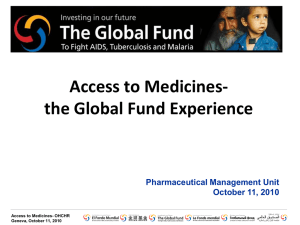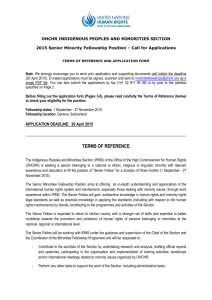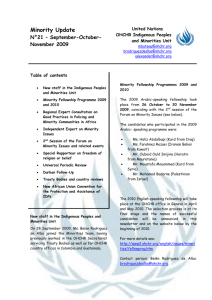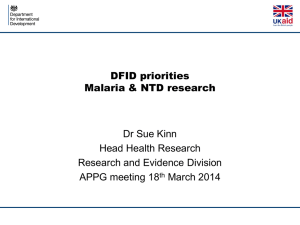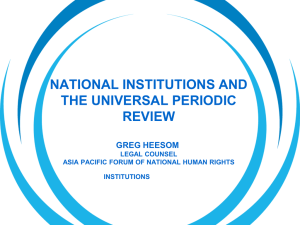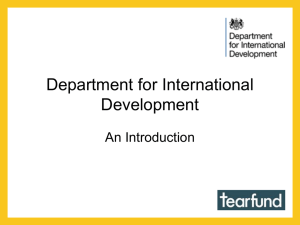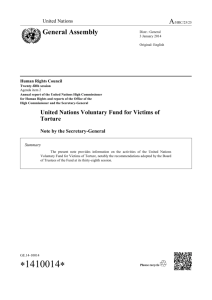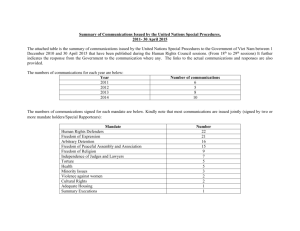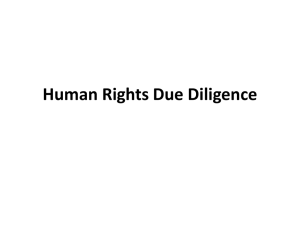(OHCHR) 2011-2015 - Department for International Development
advertisement
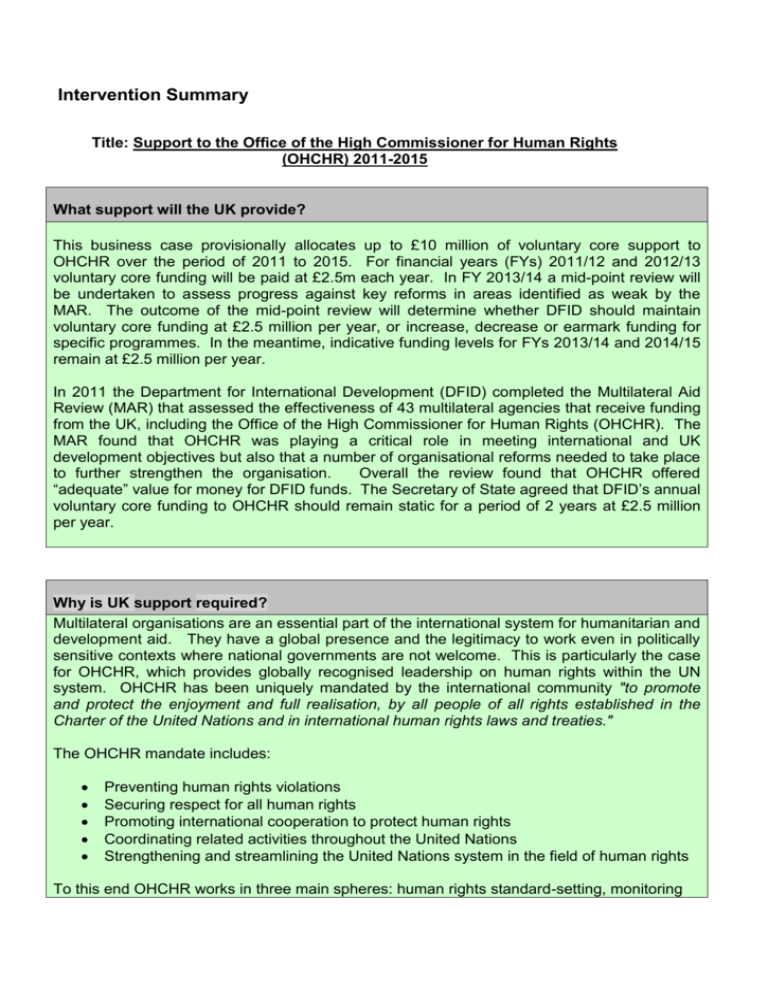
Intervention Summary Title: Support to the Office of the High Commissioner for Human Rights (OHCHR) 2011-2015 What support will the UK provide? This business case provisionally allocates up to £10 million of voluntary core support to OHCHR over the period of 2011 to 2015. For financial years (FYs) 2011/12 and 2012/13 voluntary core funding will be paid at £2.5m each year. In FY 2013/14 a mid-point review will be undertaken to assess progress against key reforms in areas identified as weak by the MAR. The outcome of the mid-point review will determine whether DFID should maintain voluntary core funding at £2.5 million per year, or increase, decrease or earmark funding for specific programmes. In the meantime, indicative funding levels for FYs 2013/14 and 2014/15 remain at £2.5 million per year. In 2011 the Department for International Development (DFID) completed the Multilateral Aid Review (MAR) that assessed the effectiveness of 43 multilateral agencies that receive funding from the UK, including the Office of the High Commissioner for Human Rights (OHCHR). The MAR found that OHCHR was playing a critical role in meeting international and UK development objectives but also that a number of organisational reforms needed to take place to further strengthen the organisation. Overall the review found that OHCHR offered “adequate” value for money for DFID funds. The Secretary of State agreed that DFID’s annual voluntary core funding to OHCHR should remain static for a period of 2 years at £2.5 million per year. Why is UK support required? Multilateral organisations are an essential part of the international system for humanitarian and development aid. They have a global presence and the legitimacy to work even in politically sensitive contexts where national governments are not welcome. This is particularly the case for OHCHR, which provides globally recognised leadership on human rights within the UN system. OHCHR has been uniquely mandated by the international community "to promote and protect the enjoyment and full realisation, by all people of all rights established in the Charter of the United Nations and in international human rights laws and treaties." The OHCHR mandate includes: Preventing human rights violations Securing respect for all human rights Promoting international cooperation to protect human rights Coordinating related activities throughout the United Nations Strengthening and streamlining the United Nations system in the field of human rights To this end OHCHR works in three main spheres: human rights standard-setting, monitoring and implementation. OHCHR also acts as the Secretariat of the Human Rights Council, its special procedures and the committees established under a number of UN human rights treaties. It has a critical role to play in encouraging States' engagement with UN human rights mechanisms, and in monitoring progress and failures in relation to international human rights standards. The Office also leads efforts to integrate a human rights approach within all work carried out by United Nations agencies. It is the comprehensiveness of OHCHR’s mandate that provides the Office with a comparative advantage over other agencies and departments that focus on specific areas of rights, or on specific beneficiaries. It has a particularly critical role in peacekeeping and peace-building work. For example OHCHR is the lead entity for the UN in the area of transitional justice. But OHCHR’s work is also important in ensuring the integration of human rights into MDGs work. It contributes to the creation of stable environments and respect for the rule of law. Both are important for sustainable development. DFID is providing support to OHCHR because: The UK government is committed to human rights as a cornerstone of its foreign and development policy, and OHCHR is the unique institutional home for human rights within the UN system and worldwide. The Foreign Secretary has stated the importance of placing strong institutions and the rule of law at the heart of future human rights work. Strong institutions and upholding the rule of law sit at the heart of OHCHR’s mandate. The work of OHCHR has been seen as helping to deliver on the MDGs as well as reinforcing links between security, development and human rights as set out in a number of international agreements. Working with OHCHR has helped deliver DFID’s priorities in areas such as access to justice. Human rights protection contributes to the building of peaceful states and societies and to addressing the underlying causes of conflict and fragility, such as failures in human rights protection. OHCHR has a global remit and works extensively in DFID priority countries. OHCHR is also important to the work of other UK government departments, including the Foreign and Commonwealth Office (the lead UK government department for human rights), the Ministry of Justice and the Home Office. It drives international standard setting in human rights which supports broader UK government policy, covering subjects from counter-terrorism to the treatment of migrants. The UK will maintain voluntary core funding to OHCHR as its activities have a direct link to the UK Government’s policy objectives on human rights issues, particularly in the context of working in fragile states and countries emerging from conflict and ensuring human rights is at the heart of the UN and States’ work to achieve the Millennium Development Goals. What are the expected results? DFID expects to see OHCHR successfully deliver on the priority objectives set out in its present and forthcoming Strategic Management Plans (SMPs)1, and in particular: An increase in the number of countries where adequate legislation and policies are in place to ensure access of discriminated groups to justice and selected basic services (OHCHR is present in 20 countries working on this issue). An increase in the number of countries of engagement where the UN Common Country Programme/UNDAF has satisfactorily integrated international human rights standards and principles into its operations. We also expect to further address the reform priorities identified through the MAR These include: OHCHR improves its results framework by ensuring that key elements such as, baselines, targets, outputs etc are included and that a results based management culture is mainstreamed at all levels of the organisation. This would clarify OHCHR’s contributions to humanitarian and development results. Stronger monitoring and evaluation functions and evidence that evaluations are acted upon. This, together with strengthened results based management needs to lead to improved portfolio management at the project level. For example OHCHR should show that poorly performing projects and programmes are being curtailed, and savings are being recycled into better performing parts of OHCHR’s portfolio. OHCHR also needs to strengthen its impact through leveraging additional effort from other larger organisations. As such we would like to see increased OHCHR effectiveness in mainstreaming human rights work across the UN. OHCHR further strengthens its role and impact in fragile states and countries emerging from conflict, particularly in areas of UK priority, including support to peace building and peacekeeping work and in tackling violence against women and girls. OHCHR’s present SMP covers the period 2010-11.As of 2012, the name of this document will be “OHCHR Management Plan-Working for results” (OMP) An update to be published by the end of 2011 will cover 2012-13, and thereafter there will be OMPs covering a four year period. 1 Business Case for: Support to the Office of the High Commissioner of Human Rights (OHCHR) 2011-2015 Strategic Case A. Context and need for DFID intervention Summary The MAR found that OHCHR has a critical role in peace and security as the only UN multilateral organisation focussed exclusively on the promotion and protection of human rights. This justifies continued support. There are however a number of organisational reforms that need to be addressed in the short term. The UK Government will work closely with OHCHR to ensure that important reforms are taken forward, leading to improved delivery on the ground. Background Multilateral organisations are an essential part of the international system for humanitarian and development aid. They have a global presence and the legitimacy to work even in politically sensitive contexts where national governments are not welcome. They provide specialist technical expertise, and deliver aid on a large scale. They offer a wide-range of aid instruments to meet the needs of all countries. They have legitimacy to lead and coordinate development and humanitarian assistance. They broker international agreements and monitor adherence to them. They develop and share knowledge about what works, and why. The promotion and protection of human rights is one of the fundamental goals and purposes of the United Nations. Within the UN system, OHCHR is the only UN entity that exclusively focuses on human rights. The High Commissioner, Navanethem Pillay, is the principal human rights official in the UN. OHCHR is part of the UN Secretariat and is not an agency, fund or programme. It is uniquely mandated by the international community “to promote and protect the enjoyment and full realisation, by all people of all rights established in the Charter of the United Nations and in international human rights laws and treaties.” The OHCHR mandate includes: Preventing human rights violations, Securing respect for all human rights, Promoting international cooperation to protect human rights, Coordinating related activities throughout the United Nations, and Strengthening and streamlining the United Nations system in the field of human rights. To this end it works in three broad areas: human rights standard-setting, monitoring, and implementation. OHCHR also acts as the secretariat of the Human Rights Council, its special procedures, and the committees established under a number of UN human rights treaties. It has a critical role to play in encouraging States’ engagement with UN human rights mechanisms, and in monitoring progress and failures in relation to international human rights standards. The Office also leads efforts to integrate a human rights approach within all work carried out by United Nations agencies. OHCHR plays a supportive role in the delivery of the MDGs and in poverty reduction. Specifically, OHCHR provides technical assistance to governments and other stakeholders on human rights aspects of poverty reduction strategies, ensures that human rights are incorporated into UN country teams’ programming principles, promotes implementation of international human rights instruments and develops specific projects to involve and empower vulnerable groups. OHCHR works for the advancement of civil and political rights as well as providing technical assistance to governments, national human rights institutions and civil society on poverty reduction strategies and on protecting economic, social, cultural rights. It is an important partner in enabling the UK to deliver on its human rights objectives where it has limited resources or is constrained by politics. Its relevance to DFID’s priorities is likely to grow given the increasing focus on fragile states in the UK’s development programme. The Arab spring has raised the profile of OHCHR, further demonstrating its importance to the international community. OHCHR is managed by the High Commissioner (Navanethem Pillay) and her senior management team. OHCHR is part of the UN Secretariat and has an unusual chain of accountability, one that the UK has consistently defended given its unique role. It has no governing board. Its mandate is set by the UN General Assembly and more broadly by the UN Charter. Under the terms of her mandate, the High Commissioner is subject to the authority of the UN Secretary-General. OHCHR has a global mandate with a headquarters in Geneva, a presence in New York and a network of regional and country offices, and a presence in the vast majority of UN peace missions across the globe. At the end of 2010 OHCHR employed 1,005 staff and was present in a total of 54 field offices. OHCHR’s scale in comparison to other UN organisations is small, and although human rights is the third pillar of the UN, its share of funds from the UN regular budget does not fully reflect the importance of this issue since only 2.8% of funds are allocated to OHCHR. OHCHR is important to the achievement of UK human rights objectives for a number of government departments. It drives international standard setting in human rights which directly impacts on UK departments including the Foreign and Commonwealth Office, Ministry of Justice and the Home Office, covering subjects from counter-terrorism to the treatment of migrants. Multilateral Aid Review Findings The Multilateral Aid Review (MAR) was commissioned by the DFID Secretary of State in 2010 to assess the value for money and impact provided by multilateral agencies that receive funding from the UK. The MAR found that OHCHR is critical in meeting both international and key UK Government objectives, but that OHCHR’s performance needs to improve in a number of areas. Overall OHCHR was judged to offer adequate value for money for DFID aid funds. OHCHR’s strengths are: Its critical role in fragile states supporting human rights monitoring and wider peace building objectives. Its good record of working in partnerships with others including civil society groups and those directly affected by conflict and violence. Areas where OHCHR’s performance needs to improve are: Better results based management - OHCHR improves its results framework by ensuring that key elements such as, baselines, targets, outputs etc are included and that a results based management culture is mainstreamed at all levels of the organisation. This would clarify OHCHR’s contributions to humanitarian and development results. Improved evaluation systems – OHCHR needs to strengthen its evaluation systems and ensure that evaluation recommendations are acted upon leading to improvements in programme quality and impact. Better project portfolio management – As a consequence of strengthened results based management and evaluation functions OHCHR needs to ensure that poorly performing projects and programmes are curtailed, and savings are then recycled into better performing parts of OHCHR’s portfolio. Delivery of results in areas of comparative advantage - OHCHR’s comparative advantage in fragile states and countries emerging from conflict, particularly in areas of UK priority, including support to peace building and peacekeeping work and in tackling violence against women and girls is strengthened. We expect that, OHCHR will be better placed to address the above priorities after the new Strategic Management Plan is published at the end of 2011. Recent reforms and improvements in delivery and strategic management have shown OHCHR to be a reforming organisation, so prospects for further improvements are good. Since 2002, voluntary contributions have almost tripled, rising from $40 million in 2002 to a projected figure of more than $115 million in 2009. Over the same period, the proportion of voluntary unearmarked funding has risen steadily from seven percent to a projected figure of 57 percent. Table 1: Income (millions of US$)* Voluntary “unearmarked” income Voluntary “earmarked” income Total 2007 40.9 2008 64.6 2009 66.1 2010 59.3 54.8 55.2 52 50 95.7 119.8 118.1 109.3 *Above totals include all income to OHCHR including income for the humanitarian trust funds which OHCHR administers. Table 2: Top 7 donors in 2010 (voluntary contributions, millions of US$) DFID provided voluntary core funding to OHCHR of £2.5 million in both 2009/10 and 2010/11. The UK’s voluntary contributions in 2010/11 totalled $5,429,354 (£3,438,573) 73% of which was voluntary core. This made the UK the eighth largest contributor of voluntary contributions to OHCHR in 2010. OHCHR heavily depends on voluntary contributions for a large part of its funding, with 40% being provided from the UN regular budget and 60% from voluntary contributions. The table below details the top seven donors to OHCHR. The UK is the eighth largest donor to OHCHR. 1 USA 2 Norway 3 Netherlands 4 Sweden 5 Spain 6 European Commission 7 Germany $19.3 $11.3 $10.2 $8.4 $6.8 $6.7 $6.3 B. Impact and Outcome DFID is providing support to OHCHR because: The UK government is committed to human rights as a cornerstone of its foreign and development policy, and OHCHR is the unique institutional home for human rights within the UN system and worldwide. The Foreign Secretary has stated the importance of placing strong institutions and the rule of law at the heart of future human rights work. Strong institutions and upholding the rule of law sit at the heart of OHCHR’s mandate. The work of OHCHR has been seen as helping to deliver on the MDGs as well as reinforcing links between security, development and human rights as set out in a number of international agreements. Working with OHCHR has helped deliver DFID’s priorities in areas such as access to justice. Human rights protection contributes to the building of peaceful states and societies and to addressing the underlying causes of conflict and fragility, such as failures in human rights protection. OHCHR has a global remit and works extensively in DFID priority countries. Theory of Change Unlike voluntary non-core (known in OHCHR as “earmarked”) funding, voluntary core (“unearmarked”) funding is not tied to a specific project or programme. It supports all of the work of the organisation. The underpinning theory of change is as follows. Whilst OHCHR is already playing an important role it could be more effective. To deliver better results on human rights across the board OHCHR needs to improve its organisational effectiveness, through making the necessary reforms identified in the MAR. We recognise that UN reform can be slow and difficult but this will only succeed through strong engagement with key stakeholders. OHCHR will need strong leadership to ensure it can reform in the right direction. The UK government will be clear with OHCHR on the reforms we need to see and use our funding and influence to encourage performance improvements against these organisational-wide reforms. The UK will support OHCHR on this reform agenda through our strong technical focus on results and improved value for money. Whilst careful to respect the independence of OHCHR’s mandate, we will work with other key donors to support OHCHR management reforms. As a result of stronger engagement and strengthened support leading to reforms being achieved OHCHR’s overall efficiency and effectiveness in-country is expected to improve. This will allow it to deliver better results in the areas of its mandate which are important to the UK (promoting and protecting human rights with particular focus on fragile states and countries emerging from conflict, including support to peace building and peacekeeping work (e.g. effective follow-up to Security Council Resolution 1325) and in tacking violence against women and girls. While much of DFID’s voluntary core funding supports programme delivery, OHCHR’s results monitoring and reporting needs to be further strengthened so that we are able to clearly identify the results it delivers on the ground. Expected Results DFID expects to see OHCHR successfully deliver on the priority objectives set out in its present and forthcoming OHCHR Management Plans (OMPs)2, and in particular: An increase in the number of countries where adequate legislation and policies are in place to ensure access of discriminated groups to justice and selected basic services (OHCHR is present in 20 countries working on this issue). An increase in the number of countries of engagement where the UN Common Country Programme/UNDAF has satisfactorily integrated international human rights standards and principles into its operations. We also expect to further address the reform priorities identified through the MAR These include: OHCHR improves its results framework by ensuring that key elements such as, baselines, targets, outputs etc are included and that a results based management culture is mainstreamed at all levels of the organisation. This would clarify OHCHR’s contributions to humanitarian and development results. Stronger monitoring and evaluation functions and evidence that evaluations are acted upon. This, together with strengthened results based management needs to lead to improved portfolio management at the project level. For example OHCHR should show that poorly performing projects and programmes are being curtailed, and savings are being recycled into better performing parts of OHCHR’s portfolio. OHCHR strengthens its impact through leveraging additional effort from other larger organisations. As such we would like to see increased OHCHR effectiveness in mainstreaming human rights work across the UN. OHCHR further strengthens its role and impact in fragile states and countries emerging from conflict, particularly in areas of UK priority, including support to peace OHCHR’s present SMP covers the period 2010-11. An update to be published by the end of 2011 will cover 2012-13, and thereafter there will be OMPs covering a four year period. 2 building and peacekeeping work and in tackling violence against women and girls. The above steps will help to ensure that DFID can show the UK public where their money is being spent, how effectively it is being used and what results it delivers. It will help to ensure that OHCHR is able to prioritise effectively and deliver against its mandate. Consequences of Decreasing or Not Funding DFID provided 6.7% of OHCHR’s voluntary core resources in 2010. Significantly reducing or stopping DFID’s voluntary core funding would result in OHCHR reducing the number of programmes it was able to carry out internationally and on the ground, particularly given that OHCHR’s network of field presences are funded by voluntary contributions. This would affect the achievement of UK development objectives, particularly where OHCHR has a critical role. If DFID stopped providing or significantly reduced its voluntary core funding OHCHR would have fewer resources to allocate flexibly to fund the wide-ranging organisational reform agenda that the High Commissioner has set out. It would also potentially lessen UK Government influence with OHCHR, particularly on areas which speak to MAR reforms. On the other hand if DFID and other donors sharply reduced voluntary core funding this could create a strong momentum for change. DFID should assess the progress on the reform agenda in two years’ time and then adjust its voluntary core funding levels accordingly. Appraisal Case A. Determining Critical Success Criteria (CSC) Each CSC is weighted 1 to 5, where 1 is least important and 5 most important based on the relative importance of each criteria to the success of the intervention. CSC for Results/Reform 1 OHCHR continues to play a critical global leadership and 2 3 4 country level delivery role OHCHR continues to improve business practices where clear results chains are developed, with RBM mainstreamed at all levels of the organisation. Stronger monitoring and evaluation functions and evidence that evaluations are acted upon. OHCHR makes effective use of its comparative advantage in fragile states and countries emerging from conflict, particularly in areas of UK priority, 5 5 4 4 B. Feasible options The MAR has identified the key areas in which OHCHR is operationally and organisationally weak. Our reform agenda is defined by the MAR. There are other areas that OHCHR needs to reform but the selected areas have been prioritised as those which are weakest and which we judge would result in the greatest improvements in OHCHR’s organisational effectiveness and delivery on the ground. The theory of change underpinning this intervention has been outlined in Part B of the Strategic Case. In order to make progress on reforms DFID needs to use our funding to drive forward reforms and increase our influence in the organisation. To achieve we considered two financing options. There are also different approaches to how we can influence the organisation. These are also discussed below. Option 1: Voluntary core funding This type of funding is allocated to an institution (such as OHCHR) but is not tied to a particular theme or project. It can be spent against any activity that relates to OHCHR’s mandate. Option 2: Voluntary non-core funding This type of funding can be allocated against specific projects in country (for example a Human Rights project in Colombia) or by a particular theme (for example access to justice and basic services). Once allocated it can not be spent on other issues beyond the scope of the original project or theme. Environmental Considerations OHCHR’s performance under the Climate Change and Environmental Sustainability criterion in the MAR was not judged. OHCHR’s engagement in country largely takes the form of Human Rights advisers and experts providing technical advice and guidance to government, civil society and other groups rather than through specific programmes. This means specific policies on low carbon and sustainable development are often not relevant or applicable to OHCHR. Environmental and Climate safeguards are not relevant and practical when looking at the context of the interventions OHCHR makes within a country which are often in a post conflict of humanitarian crisis situation. That said, there will be a number of cases where human rights issues are directly related to conflict over access to natural resources (water, forests, etc), or where climate stress/ natural resource scarcity are considered drivers of conflict. In those cases, OHCHR professional staff should be encouraged to consider the links to wider policies on sustainability or natural resource governance, and where possible to seek opportunities to link up to other parts of the UN system doing relevant work, e.g. on water resource management, drivers of deforestation, etc OHCHR’s new Environment Plan will enable the Office to better track the impact of its activities. Engagement / Influencing DFID will work with OHCHR to improve its results based management and ultimately its delivery of priority Human Rights programmes in country. In order to do this OHCHR needs to strengthen its management systems and ensure that the staff in-country have the necessary skills to be able to operate its systems. This will encourage better monitoring and reporting of results as well as better follow up on evaluation findings ensuring value for money. To support this DFID will work with specific country offices to seek feedback, understand delivery problems at country level and track OHCHR’s progress towards improved delivery. These issues can then be addressed bilaterally with OHCHR. DFID officials will strategically push for reforms and improvements through the appropriate channels. Officials will work directly with other like-minded donor countries to build alliances around our reform priorities. We will also look for opportunities to engage with OHCHR staff as and when the opportunity arises. UNCD’s Results Adviser will provide support to OHCHR to assist it in understanding and refining its results management, monitoring and reporting. C. Appraisal of options Option 1: Voluntary core funding The benefits of this option 1 are DFID will continue to have legitimacy and leverage with the agency and other member states on key reforms. The provision of voluntary core support will allow OHCHR to maintain a significant international presence and operate in countries were DFID cannot work, but still have a high need for a focus on human rights issues. The provision of core funding allows OHCHR greater freedom to make strategic decisions about resource allocation in line with priorities set out in its strategic plan. OHCHR can use DFID’s funding to implement MAR reforms which will make them more efficient and effective. The costs of option 1 are: In the absence of a robust results framework voluntary core funding does not have a direct link to country level results and so DFID’s funding can not be directly attributed to progress against specific development results. DFID will need to maintain a sufficient policy engagement with OHCHR to ensure these funds are well spent. Cutting DFID’s voluntary core support could weaken the financial viability of OHCHR as it needs a certain level of voluntary core funding in order to have the autonomy and flexibility to allocate resources as required. Reducing or stopping our voluntary core contribution to OHCHR could slow progress on human rights issues in fragile states and countries emerging from conflict, thereby having a negative effect on achieving UK development objectives in these priority countries. Option 2 - Voluntary non-core funding An alternative would be to earmark our funding i.e. only provide funding to be used for a specific programme. There is currently only a small amount of DFID funding (approximately £500,000 per year) which is allocated for a specific purpose. The benefits of this option 2 are DFID can target specific programmes or themes which are important to UK development objectives and more robustly measure results. It would potentially allow DFID to reduce its central engagement with OHCHR. The costs of option 2 are: DFID would lose influence with OHCHR on priority issues relating to human rights and have reduced leverage over key reforms that we need to see. As voluntary non-core funding is restrictive it would only allow OHCHR to operate where donors provide adequate support. This would mean that OHCHR would not be able to use these resources for programmes elsewhere where needs are still unmet and this would reduce the effectiveness of OHCHR in reaching all of those most in need. D. Comparison of options The same weighting is used as for CSC above. The score ranges from 1-5, where 1 is low contribution and 5 is high contribution, based on the relative contribution to the success of the intervention. Analysis of options against Critical Success Criteria Option 1 Option 2 CSC 1 2 3 4 Totals Weight (1-5) 5 5 4 4 18 Score (1-5) 5 5 5 5 20 Weighted Score 25 25 20 20 90 Score 2 3 3 1 9 Weighted Score 10 15 12 4 41 Add more necessary columns as Conclusion Voluntary non-core funding is a useful tool when there is a particular project or theme being funded. However, as described above, earmarked funds only have limited coverage and cannot cover all of an agency’s mandated areas of work in all countries where there is a need. The MAR found that OHCHR needs to make changes at an organisational level. A provision of voluntary core funding is the best way to support these efforts. Voluntary core funding also enables DFID to legitimately promote organisational reforms. Without voluntary core funding it is also arguable that the impact of DFID’s voluntary non-core funding is also reduced. In order to ensure that we continue to have influence over the organisation and make progress on reform priorities we will engage more directly with the agency on issues such as strengthening results reporting and monitoring and evaluation. We will also encourage OHCHR to work within areas of comparative advantage. We will also look for opportunities to push our reform issues through direct contact with the organisation at all levels. We will build stronger relations with other member states who consider that reform is necessary to improve the effectiveness and efficiency of OHCHR and we will look for a stronger relationship with the agency on these issues. The provision of voluntary core funding allows DFID to pursue these objectives. However, if the mid-point review indicates that no progress is being made on our top reform requirements, then DFID will consider changing our approach to funding to continue to ensure maximum value for money for the UK taxpayer. In the meantime the provision of voluntary non-core funds can continue at the DFID country level where there is a clear business case for this. E. Measures to be used or developed to assess value for money DFID will use the same broad criteria to assess the value for money of its voluntary core contribution to OHCHR in two years’ time that were used under the MAR. In FY 2013/14 a further review will be undertaken to assess progress against key reforms areas identified as weak by the MAR, which included weak results based management and a weak evaluation function with poor follow up on evaluation findings. The implication of this is that OHCHR does not have the systems in place to maximise the performance of its programmes. As a result of the outcome of the mid-point review, DFID will decide if the best value for money can be achieved by continuing voluntary core funding at £2.5 million per year, increasing this amount, decreasing it and/ or earmarking for specific programmes. In the meantime, indicative funding levels for FY 2013/14 and FY 2014/15 have been made at £2.5 million per year. Although there are a range of measures which OHCHR can take to maximise value for money, its flexibility on cost control is limited as i) UNDP disburses all OHCHR funds in the field, and ii) as part of the UN Secretariat some of its administrative systems are centrally controlled. However there is evidence that OHCHR does apply best value for money principles when channelling money to external parties. There is evidence that OHCHR’s senior management take account of return and cost effectiveness. They established two bodies chaired by senior management to oversee compliance: the Programme and Budget Review Board (PBRB) and the Financial Monitoring Committee. Following a revision of the planning process work-flow, the Financial Monitoring Committee has been merged with the PBRB. The PBRB reviews OHCHR’s financial situation on a monthly basis. The PBRB has rejected projects that do not consider value for money. The UN Board of Auditors has asked OHCHR to participate in a forthcoming value for money exercise. OHCHR has confirmed participation but is waiting on further information. We will ensure that we follow this process. Commercial Case A. Value for money through Procurement The MAR found no material weakness in OHCHR’s approach to procurement. The nature of OHCHR work means that there is not much procurement. In 2010, OHCHR spent US$4.9 million on procurement. In some instances UNDP procures goods and services on behalf of OHCHR in the field. OHCHR reflect this in its financial accounting as a payment to UNDP. OHCHR applies best value for money as the general principle for procurement. It uses the system available to the UN Secretariat in order to procure goods and services, meaning that it is also bound by strict UN Secretariat rules to ensure the cheapest option is selected that meets the specification. Financial Case A. How much it will cost Voluntary core funding will be £2.5m per year for each of FY 2011/12 and 2012/13. In 2013 DFID will review progress against the MAR reform priorities and Ministers will take a decision as to whether funding should remain the same, increase, decrease or be voluntary non-core. Pending that review a further £2.5 million has been provisionally set aside for each of FY 2013/14 and 2014/15. B. How it will be funded: capital/programme/admin The funding will be paid from DFID’s programme budget. C. How funds will be paid out The £2.5 million allocation for FY 2011/12 and 2012/13 will be released in one payment. For FY 2011/12 and 2012/13 DFID will make one £2.5 million payment October. By September 2013 the mid-point review will have been completed. DFID expects to release funding for FY 2013/14 by October. For FY 2014/15 payments will be made in October. The timing of payments will be set out in a Memorandum of Understanding between DFID and OHCHR. D. How expenditure will be monitored, reported, and accounted for OHCHR is part of the UN Secretariat and in line with its unique role does not have separate governance arrangements. OHCHR’s expenditure is monitored through the UK’s engagement at key meetings and bilaterally with OHCHR, as required, including at bespoke annual donor consultations. These functions are carried out by both officials in the UK and also at the UK’s Mission to the UN in Geneva. OHCHR provides an annual report of activities including financial statements showing an extensive breakdown of income and expenditure. Its budget is agreed biennially by the 5th Committee of the General Assembly. All Member States are given an opportunity to comment on the budget. The next budget negotiations are due to take place in autumn 2011. OHCHR is only part of the Secretariat bidding for an increase in budget (current level of funding from UN Regular Budget is 2.8%). DFID’s voluntary core financial contribution is accounted for through a biennial set of certified accounts. The Board of Auditors is responsible for the biennial report which is attached to the main Secretariat accounts published as a General Assembly document in the autumn following the end of the financial period. This report provides an opinion on the financial integrity of the organisation. The next report is expected to be published in autumn 2012. Member states are provided with a Programme Performance Report on a biennial basis from the Policy and Oversight Coordination Services of the Office of the Under-Secretary General’s Department of Management. Donors can raise issues at donor consultation meetings. Management Case A. Oversight Governance arrangements OHCHR is a small division of the UN Secretariat and therefore has no separate governing board. Its mandate is set by the UN General Assembly and more broadly by the UN Charter. Under the terms of her mandate the High Commissioner is subject to the authority of the UN Secretary-General. OHCHR is also mandated to undertake certain activities by both the HRC and General Assembly resolutions. The UK, as a Member State, mandates some work through resolutions agreed in those fora. As a division of the UN Secretariat, OHCHR’s broad plans are agreed every biennium by the General Assembly. During these negotiations, the UK plays an active role, particularly to defend the OHCHR’s independence. Others use this opportunity to try and dictate the sort of programmes and issues in which the Office should focus on – whilst we defend the right of the High Commissioner to determine her own priorities and programme of work. A number of States recently called, particularly during the Human Rights Council Review, to increase Human Rights Council (HRC) oversight of OHCHR’s work. However, the Review concluded no major changes in this regard. Oversight in OHCHR Internal audit services are provided by the UN Office of Internal Oversight Services. Oversight services such as inspections are also provided by the Joint Inspection Unit (JIU) which is mandated to conduct evaluations and inspections on a system-wide basis. Formal processes are in place that allow for a good degree of transparency in OHCHR activities. The OHCHR has the same level of oversight as other parts of the UN Secretariat. Its budget and its strategic framework area agreed biennially by the General Assembly as part of the Secretary General’s entire budget and strategic framework of UN activities. Donor engagement is good. Details of financial spend both by programme and field presences are published in the annual report. At the level of operations, the very nature of OHCHR’s work, and the extremely political context in which it operates, means that constraints are very considerable in terms of the detail OHCHR is able to disclose. The UN Board of Auditors is responsible for certifying OHCHR’s financial statements. This external audit process occurs on a biennial basis. The UK’s National Audit Office is currently the member of the Board of Auditors. This audit covers both compliance and value for money issues. OHCHR is due to be examined by UN Board of Auditors in the spring of 2012. The Board of Auditors biennial report is attached to the main Secretariat accounts and will be published as a General Assembly document in autumn 2012. B. Management DFID and FCO staff exercise due diligence in oversight of OHCHR’s activities. Key documents and reports are scrutinised to ensure that funds are spent efficiently and effectively to maximise the impact of OHCHR’s work. DFID has adequate staff resources to provide proportionate management and oversight of UK taxpayers’ funds. The team responsible for relations and oversight with OHCHR will be led by an A2 Team Leader in DFID’s United Nations and Commonwealth Department (UNCD). The team leader is also responsible for three other agencies: UNDP, UNICEF and UN Women. The A2 Accountability Adviser will be the direct agency lead and will give a proportion of her time to this. All programme management, including project reviews and payments will be the responsibility of a dedicated B2 Programme Officer. All programme management activities will be carried out in accordance with the DFID oversight requirements. The UK Mission to the UN (UKMIS) in Geneva is the focal point for engagement with OHCHR. UKMIS will take the lead on issues where discussions are sensitive and a face-toface meeting is required to ensure appropriate oversight. The UK Mission to the UN (UKMIS) in New York can also play a role where the discussions relate to wider UN issues of peace and security, or development. UNCD’s A2 results adviser will provide policy advice on the appropriateness and effectiveness of OHCHR’s results systems. Governance advice may also be provided if needed. DFID’s Internal Audit Department will provide advice on key financial papers. Procurement department will also provide advice and guidance on procurement issues as necessary. Technical inputs will be provided by a Governance Adviser in Policy Division. The Governance Adviser dedicates approximately 10 – 20% of time to human rights. This will include support provided on issues relating to OHCHR. UNCD will also use contacts with a range of DFID and other member state country offices to improve the feedback on OHCHR’s performance in country. We will continue to work closely with the Human Rights sections at the UK Mission in Geneva and New York as well as with key Foreign and Commonwealth Office (FCO) colleagues in London. As the FCO is responsible for Human Rights within Her Majesty’s Government then they will provide a vital steer on the international and political perspectives. C. Conditionality The level of funding for the outer 2 years will be dependent on progress being made against the reform agenda which was set out in the MAR. If there is little or no progress further consideration will be required as to whether funding should be decreased or voluntary noncore against specific projects/programmes. D. Monitoring and Evaluation As part of this business case DFID has developed a logical framework (log-frame) which will be used to measure OHCHR’s progress annually. The baseline for reforms in the log-frame will be the results of the MAR. The log-frame shows the high-level goals which have been set and contain indicators (what we will measure), milestones (how the end result will be reached) and targets, (what should be achieved by the end date). The information in the logframe will be reviewed annually to check if progress is being made. The progress will be assessed through information provided by OHCHR in a range of different reports. We will also seek opinions from the DFID country offices who work directly with OHCHR in-country. This will allow a systematic monitoring of performance at country level. Their views will be incorporated in the reviews. OHCHR plans to publish an update to its strategic management plan covering 2012 to 2013 by the end of this calendar year. This will include new details of targets (which are not currently available). A new four year OMP will then be produced for the period 2014-17. DFID will revise the log frame after each of these new OMPs has been produced, with a view to maximising our use of OHCHR’s own indicators. It should be noted that monitoring of OHCHR’s performance is at present difficult because, as noted in the MAR, OHCHR’s results based management systems are weak. Progress is being made (such as the recent introduction of reporting at results rather than activity level, and the establishment of a new IT platform for monitoring). DFID will continue to press for improvement and will update the log frame as advances are made. Technical level outputs are also included in the logframe and reporting against the targets as set out in the strategic plan must result in OHCHR being able to demonstrate its contribution to development outcomes which are critical to UK objectives. The first annual review will assess OHCHR’s progress against key reforms and if there have been no major events which would knock the reforms off track. At the mid-point a more holistic review will be undertaken that will result in OHCHR’s funding levels being reviewed. E. Risk Assessment The nature and political sensitivity of OHCHR’s work often constrain and limited the scope for reform in the area of human rights. It can only operate in countries at the invitation of the recipient government. To mitigate this risk it is imperative that the UK works closely with OHCHR Senior Management and likeminded donors to agree sufficiently broad parameters for reform. Risk Probability Reforms stall due Medium to wider inefficiencies in UN Secretariat operations on which OHCHR depends. Impact Mitigating actions Medium Push from UK for greater efficiency in the wider UN reform context, e.g. in Fifth Committee, ACABQ, Geneva Group discussions. OHCHR’s Strategic Medium Management Plan moves away from areas of strength and UK interest, esp. fragile states and gender objectives. UK Posts and DFID Medium country offices do not prioritise stronger OHCHR operations. Increased work Medium mandated by the Human Rights Council leads to OHCHR reducing country-work of value to HMG High Use a range of contacts with High Commissioner (inc UKMis Geneva, Ministers, HRC etc) to raise the UK’s key human rights priorities and have these reflected in OHCHR’s work. Medium Focus on small number of country offices where more effective OHCHR operations are important. High Encourage OHCHR to prioritise effectively to ensure other important areas of its work are not overlooked. F. Results and Benefits Management The logical framework sets out the goal, impact, outcomes and outputs for this business case. The logical framework is based on the reform priorities identified through the MAR and if these are delivered this should lead to better, more efficient performance by the agency at the country level. Milestones have been included where possible to assess if progress is on track. OHCHR plans to publish an update to its management plan by the end of 2011. We will revisit the log-frame after this in seeking to ensure that we use OHCHR’s own targets and baselines as far as possible. We are also likely to undertake major changes after the mid point review in 2013 and will seek to introduce more targets that relate to OHCHR’s incountry delivery and MAR reform areas. In the interim: Overachievement would constitute OHCHR being judged as a satisfactory performer against the MAR reform areas (results, evaluation and working in areas of comparative advantage) and no slippage in all other areas by the mid-point review in 2013. Underachievement would constitute OHCHR being judged to have made no, or negative, progress against the MAR reform areas (results, evaluation and working in areas of comparative advantage) by the mid-point review in 2013. DFID will increase our engagement with DFID country offices and other non-focus countries to gather more feedback on OHCHR’s performance in-country. The log-frame is annexed.

